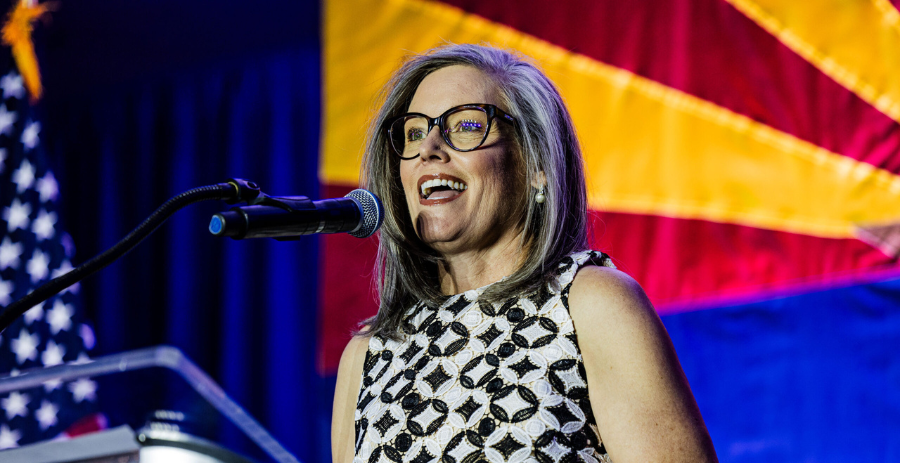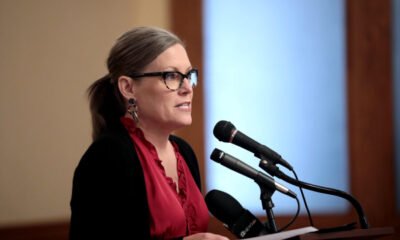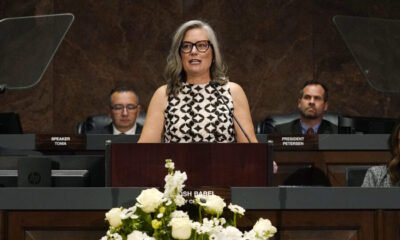ADLCC Executive Director Elsa O’Callaghan
Hobbs Exonerated: Consultants Point to Other Factors Behind Dems’ Legislative Setback

Arizona Governor Katie Hobbs faced challenges in her efforts to flip the state Legislature during the recent election cycle, leading to an increase in Republican majorities. While Hobbs had emphasized her goals of both flipping the Legislature and securing Proposition 139, which codifies abortion rights, the election outcomes diverged from her expectations.
Proposition 139 was successfully passed on November 5, yet Democrats found themselves further from legislative power. At a press conference on November 14, Hobbs indicated that she would not have altered her approach to the election.
“We did what we needed to do, and I’m going to work with the Legislature that Arizonans elected,” Hobbs stated, emphasizing her commitment to collaboration.
The Arizona Democratic Legislative Campaign Committee, in collaboration with Hobbs during the campaign, attributed the increased Republican presence to “top-of-the-ticket trends.” ADLCC Executive Director Elsa O’Callaghan noted that these national trends proved daunting for down-ballot Democrats.
Some within the Republican camp began to criticize Hobbs, suggesting her influence had a detrimental impact on Democratic candidates. However, political consultants indicated that the situation was more complex.
“Blaming her for this is convenient but inaccurate,” remarked Democratic consultant Stacy Pearson. She emphasized that the challenges stem from a broader issue of voter registration, particularly among new residents who do not identify as Democrats.
Pearson noted that the Democratic losses reflected a larger political trend rather than a failure of Hobbs’ leadership. Republican consultant Barrett Marson echoed this sentiment, pointing to national dynamics as a likely factor in the election results.
Marson criticized the Democratic focus on fundraising and messaging, claiming it failed to adequately address significant issues like the economy and border security. As Hobbs prepares for the upcoming legislative session, these insights could shape her approach, especially with her potential reelection bid in 2026.
“She’ll have to read these election results and see that she may have to tack a little right and negotiate more with legislative Republicans,” he added, emphasizing the need for adaptation to voter preferences.
While no Republican candidates have officially announced plans to challenge Hobbs, rumors suggest potential contenders may emerge. However, consultants from both parties believe a primary challenge within the Democratic ranks is improbable.
“Get in at your own peril,” Pearson cautioned about potential challengers, highlighting Hobbs’ significant campaign resources and fundraising prowess as deterrents to anyone considering a run.
Although Hobbs has a substantial campaign war chest and funds remaining after the election, both Pearson and Marson warned that she must articulate more than just a record of vetoes to appeal to voters moving forward.
“She is the veto queen, there’s no doubt about that,” Marson acknowledged. However, he emphasized the importance of showcasing accomplishments and proactive initiatives in her governance.








![Members of the Arizona House of Representatives vote during a third reading of nearly three dozen bills at the Arizona State Capitol on March 4, 2025. [Monica D. Spencer]](https://arizonanews.org/wp-content/uploads/2025/06/SR-347-Secures-53M-in-Third-State-Budget-Draft-Awaiting-400x240.jpg)
![Members of the Arizona House of Representatives vote during a third reading of nearly three dozen bills at the Arizona State Capitol on March 4, 2025. [Monica D. Spencer]](https://arizonanews.org/wp-content/uploads/2025/06/SR-347-Secures-53M-in-Third-State-Budget-Draft-Awaiting-80x80.jpg)








